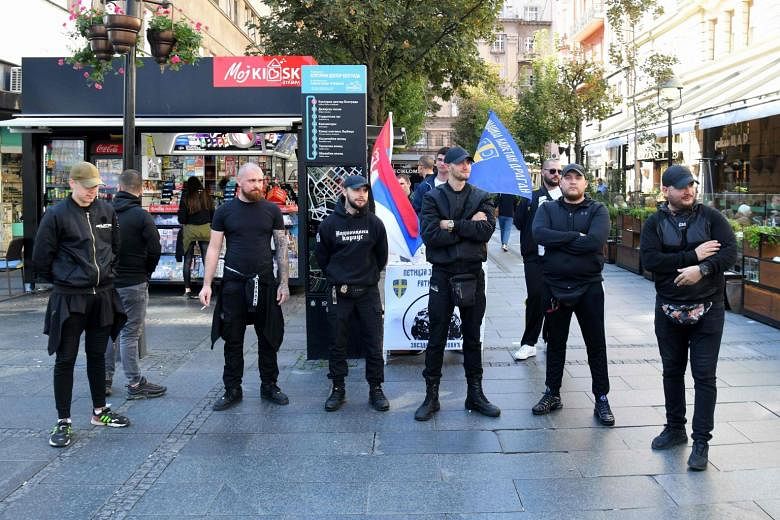BELGRADE (AFP) - In the heart of Belgrade, a convicted war criminal known as "Captain Dragan" pushes for the pardon of the man who assassinated a Serbian prime minister.
He smiles for the cameras, and nobody in the busy street seems surprised by the campaign. Three decades after the Balkans was plunged into conflict, those sentenced for committing atrocities - a few dozen in total - are slowly being freed from prison after serving sentences in foreign jails.
Upon their return to Serbia, they are accepted and even admired by top state officials and bask in the limelight of pro-government media.
Several high-profile war criminals have resumed political careers while others have led army parades or written books of revisionist history distributed through state-run publishers.
Rights activists say Serbia never undertook the kind of self-examination Germany did after World War II.
Grey-haired "Captain Dragan", whose real name is Dragan Vasiljkovic, is a former paramilitary commander who served 13.5 years for torture and murder of civilians and prisoners of war during the war in Croatia.
His campaign to grant early release for Zvezdan "The Snake" Jovanovic - a fellow paramilitary who killed reformist PM Zoran Djindjic in 2003 - has been heavily promoted by pro-government media. The US embassy in Belgrade condemned the petition.
"It is difficult to understand why a convicted war criminal has public space to promote the release of a convict for the assassination of Serbia's first democratically elected prime minister," a US embassy spokesperson told Voice of America.
Hero's welcome
Historian Dubravka Stojanovic says the campaign is the final stage of a battle against the ideas Djindjic represented.
Djindjic spearheaded the uprising that ousted the Slobodan Milosevic regime and sought to bring war criminals to justice but was murdered by former paramilitaries in league with the criminal underworld.
By 2012, former Milosevic loyalists had found a way back into power. President Aleksandar Vucic, currently Serbia's most powerful man, gained infamy as Milosevic's information minister.
He has since reinvented himself as a centre-right leader committed to delivering EU membership for his country. However, rights activists claim Vucic and his allies have also been busy revising history.
"This government made avoiding responsibility for what happened a national interest," Jovana Kolaric, from Belgrade-based NGO Humanitarian Law Center, told AFP.
The first war criminal to get formal recognition from the state was Vladimir Lazarevic, a former army commander responsible for violent expulsions of ethnic Albanians from Kosovo.
After a decade in prison, a government delegation organised a hero's welcome for him in 2015. He was invited to give lectures at Serbia's military academy and the defence ministry published his book along with the work of Nebojsa Pavkovic - another convicted war criminal.
'A free man'
Aleksandar Vulin, one of the president's closest associates, proclaimed the "end of shame" and the dawn of "a silent pride" at an army event in 2017 when he was serving as defence minister.
"Nobody will ever again be ashamed of these men," he said of two convicted war criminals in the audience. "Because the army they commanded and the people they defended weren't ashamed."
One of the war criminals in the audience, Nikola Sainovic, was Milosevic's right-hand man. He was propelled back to politics shortly after his release in 2015, and given a top job in the Socialist party, the junior partner in the governing coalition.
His path from conviction to release to political rehabilitation is becoming a well-trodden one.
Former Yugoslav army officer Veselin Sljivancanin - convicted over a 1991 massacre of some 260 people in Croatia - was admitted into the top body of Serbia's ruling party and often appears at their events.
"He is a free man who served his sentence. What would you like to do - arrest him? kill him?" Vucic said when Sljivancanin first appeared.
According to Sljivancanin, Vucic was the sole reason for his involvement in politics, and a man he would "give his life for". "Us, the fighters, always had his support. Ever since he took power, we don't have to walk with our heads down," Sljivancanin told local media.
'The ugly truth'
According to human rights lawyer Milan Antonijevic, the state is "logistically, financially and morally behind the actions of convicted war criminals".
Antonijevic argues that officials' support for those who committed atrocities is a calculated way to appease right-wing voters.
But historian Stojanovic believes this disguises an "ugly truth" - that many Serbians supported the politics that led to massacres and mass expulsions of the 1990s.
Despite Serbia formally recognising international tribunals, polls show most Serbians do not trust these courts to be impartial.
"Everyone wants to hide their own shame. The revision of history serves both those in power and society," Stojanovic told AFP. "The government, because it is neck-deep in the wars they once supported, and society, because it doesn't want to face responsibility for mass support that Milosevic's war programme had."

